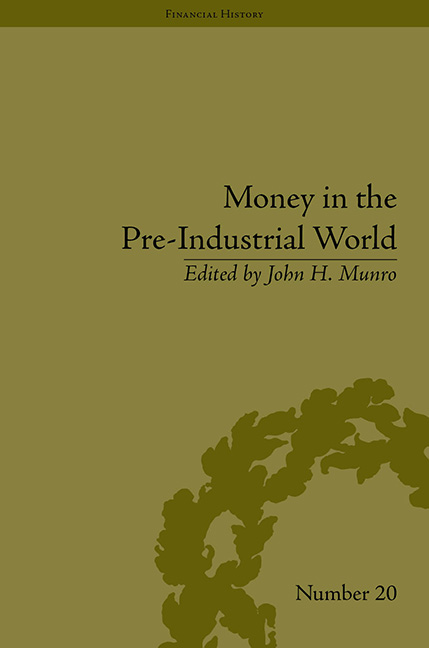Book contents
- Frontmatter
- CONTENTS
- List of Figures and Tables
- List of Contributors
- Introduction
- 1 The Technology and Economics of Coinage Debasements in Medieval and Early Modern Europe: with Special Reference to the Low Countries and England
- 2 From Aurelian to Diocletian: Financing Imperial Recovery by Coinage Debasements and Fiduciary Currencies
- 3 The Making of a Gold Standard: The Ducat and its Offspring, 1284–2001
- 4 Debasement of the Coinage and its Effects on Exchange Rates and the Economy: in England in the 1540s, and in the Burgundian-Habsburg Netherlands in the 1480s
- 5 The Amsterdam Wisselbank's Innovations in the Monetary Sphere: The Role of ‘Bank Money’
- 6 Silver in England 1600–1800: Coinage Outputs and Bullion Exports from the Records of the London Tower Mint and the London Company of Goldsmiths
- 7 The Burdens of Tradition: Debasements, Coinage Circulation and Mercantilist Public Policy Debates in Seventeenth-Century Aragon
- 8 Money or Export Commodity for Asia? American Silver in the Markets of Mexico, Castile and Amsterdam from the Sixteenth to the Eighteenth Century
- 9 Cacao Beans in Colonial México: Small Change in a Global Economy
- 10 Precious Metals, Debasements and Cowrie Shells in the Medieval Indian Monetary Systems, c. 1200–1575
- Notes
- Index
Introduction
- Frontmatter
- CONTENTS
- List of Figures and Tables
- List of Contributors
- Introduction
- 1 The Technology and Economics of Coinage Debasements in Medieval and Early Modern Europe: with Special Reference to the Low Countries and England
- 2 From Aurelian to Diocletian: Financing Imperial Recovery by Coinage Debasements and Fiduciary Currencies
- 3 The Making of a Gold Standard: The Ducat and its Offspring, 1284–2001
- 4 Debasement of the Coinage and its Effects on Exchange Rates and the Economy: in England in the 1540s, and in the Burgundian-Habsburg Netherlands in the 1480s
- 5 The Amsterdam Wisselbank's Innovations in the Monetary Sphere: The Role of ‘Bank Money’
- 6 Silver in England 1600–1800: Coinage Outputs and Bullion Exports from the Records of the London Tower Mint and the London Company of Goldsmiths
- 7 The Burdens of Tradition: Debasements, Coinage Circulation and Mercantilist Public Policy Debates in Seventeenth-Century Aragon
- 8 Money or Export Commodity for Asia? American Silver in the Markets of Mexico, Castile and Amsterdam from the Sixteenth to the Eighteenth Century
- 9 Cacao Beans in Colonial México: Small Change in a Global Economy
- 10 Precious Metals, Debasements and Cowrie Shells in the Medieval Indian Monetary Systems, c. 1200–1575
- Notes
- Index
Summary
‘Money makes the world go around’ is a commonplace, admittedly trite expression, yet one that has profound importance for the evolution of the global economy, well beyond the Industrial Revolution era that marks the temporal terminus of this collection of ten essays. Understanding how market-based economies functioned from even ancient times to the present is impossible without considering the role of money. Thus the ten authors of essays in this volume do not accept the Classical School of Economics’ view that money is ‘neutral’, in terms of its impact on economic change – a view that has led some economists to ignore the role of money. Often allied with that view is a disdain for so-called ‘monetarism’. But, to cite the famous Nobel Prize-winning Italian economist Franco Modigliani (1918–2003): if ‘monetarism’ simply means that ‘money matters’, so that monetary changes are not merely passive, neutral phenomena, but have some active role of their own, then ‘we are all monetarists’. The authors of this volume all agree that ‘money matters’ and support as well the famous corresponding observation of Marc Bloch (1886–1944): that monetary phenomena may be compared to peculiar ‘seismographs that not only register earth tremors, but sometimes bring them about’. All ten chapters in this volume focus, to one degree or another, on three inter-related themes: bullion (uncoined precious metals), coinages (precious-metal commodity moneys) and their debasements, and substitutes for precious-metal moneys.
But what is meant by ‘money’ in this volume? We may begin with the catechism presented in so many introductory economics courses: on the four functions of money. The first and most important is in serving as a medium of exchange. For Aristotle, medieval scholastics and for many in the Classical School, this was and is the only true function of money. But the other three roles of money are also vitally important: as a ‘money of account’, or standard of value used in reckoning prices, costs and values; as a store of value (i.e. if the purchasing power of money remains stable); and as a standard of deferred payment (money in the form of a wide variety of credit instruments).
- Type
- Chapter
- Information
- Money in the Pre-Industrial WorldBullion, Debasements and Coin Substitutes, pp. 1 - 14Publisher: Pickering & ChattoFirst published in: 2014



